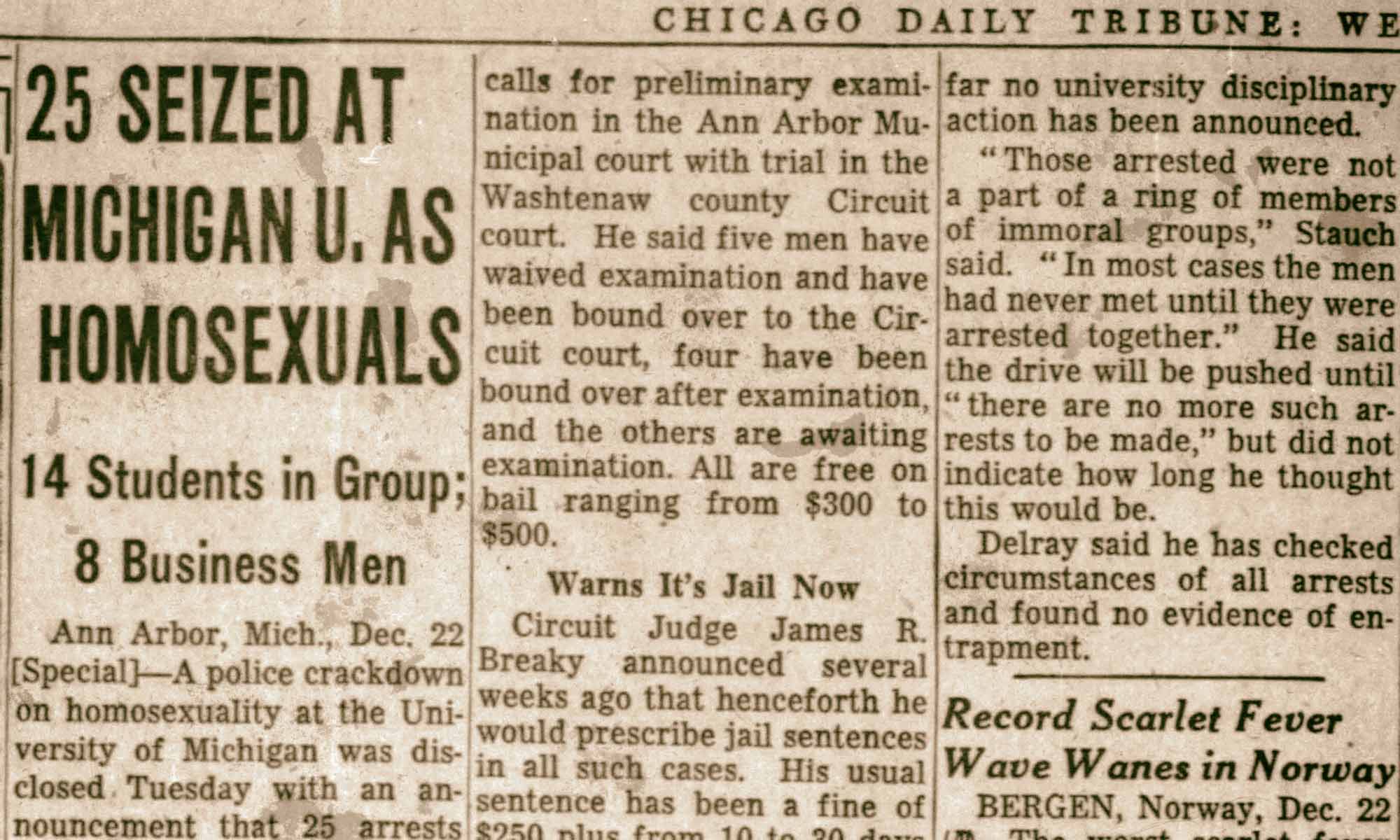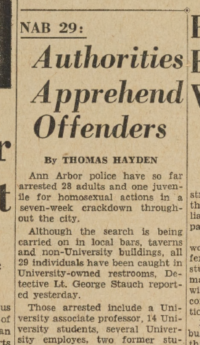
On December 22, 1959, Ann Arbor, Michigan, witnessed a wave of arrests for “homosexual actions.” The arrests came after a seven-week investigation involving “local bars, taverns, and non-University buildings,” according to the University of Michigan’s student newspaper, the Michigan Daily.
Despite the investigation’s city-wide scope, all of the arrests — of twenty-five adult men — occurred on university property. By January 5, the number had risen to twenty-nine, including one juvenile. They were arrested, allegedly, for indecent acts in campus restrooms. Those caught in the dragnet included fourteen students, an associate professor, two former students, a former school teacher from neighboring Ypsilanti, a local radio disc jockey, eight businessmen, and several other university employees and townspeople. The faculty member was expected to resign. The students were brought before “a group of University officials, who will consider their cases individually.”
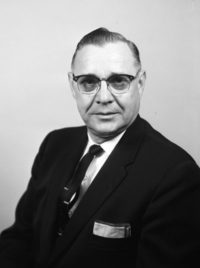
Ann Arbor police detective Lt. George Stauch praised the university for “cooperating very well.” Curiously, an unnamed university official said, “We did not know about this search when it began and were not consulted until very recently.” Stauch explained to Michigan Daily, very briefly, how his operation worked:
Lt. Stauch praised the work of a trio of special plainclothes officers who made the arrests. The officers reportedly lingered in campus restrooms, making verbal and written agreements with various individuals. The individuals were later arrested.
This is a curious detail. It tells us that at least some of the arrests were based solely on conversations or passed notes, the same kind of communications that routinely took place between straight students in classrooms, cafeterias, on the Diag and in the library.
And furthermore, they weren’t arrested in the act, but sometime but later — after they made their “agreements” but before any actual “gross indecency” occurred. As Stauch described it, this is all that happened: some guys saw a good-looking guy with nothing better to do than to hang around the restroom for hours on end. They either struck up a conversation or passed a note to him. Sometimes they tapped a toe in his direction which, according to later testimony, “started a chain of events that led to note writing.” And for that, they wound up getting arrested for their trouble. The entire operation clearly relied on entrapment, as California gay rights activist and Mattachine Review publisher Hal Call later confirmed:
In one of the opening examinations of one of those arrested at Ann Arbor, this exchange occurred when the lawyer questioned the arresting officer:
“What time was the arrest made?”
“10:30.”
“What time did you enter the restroom?”
“8:45.”
“That’s a hell of a way to make a living, isn’t it?”
A reporter, who states that he knows two of those arrested in Michigan, added that it was the plainclothesman in each instance who started the conversation and made the advances. [Emphasis mine]
Students Respond

All those arrested faced charges of gross indecency or attempted gross indecency, which under Michigan law was more or less the same thing. The law provided a penalty of up to five years in state prison or a fine of up to $2,500 (about $21,200 today). Repeated offenses could incur life in prison.
Student reactions, as shown in the pages of the Michigan Daily, ranged from humor to sympathy for the poor homosexuals. The sympathy, however, disguised an entirely different kind of condemnation. The first letter published the paper published shows how that worked. That letter, apparently signed by multiple people, was so sympathetic that it required anonymity. “Names withheld by request” found the punishment wrong-headed:
In our opinion, these actions are inappropriate retaliation for homosexuality. Homosexuality is a psychological illness or mental disorder and should be treated as such. If the state has reformed to the point of establishing mental institutions to help those who are mentally ill, why cannot these homosexuals, who are also defined as mentally ill, be admitted to mental institutions and given special care instead of being committed to criminal institutions?
When these homosexuals are not given proper care but are put in criminal institutions where they are confined to a small area in an all-male population, there is greater opportunity to further their homosexual activities. We feel that if the state is going to take any action, it should take the proper action and confine these individuals to institutions that would help to cure them rather than to institutions that would contribute to their illness.
Another letter writer, unafraid to sign her name, called the police actions “humiliating” — not for those arrested, but for her. She was mortified that the arrests flew “in the face of modern medical knowledge.” She wanted the law changed before police “begin setting up traps for obsessive compulsives and/or senile depressive neurotics.”
“Of Dubious Value”
The Michigan Daily let it be known that it, too, was similarly concerned. Staff writer Thomas Hayden’s editorial, “Homosexual Crackdown of Dubious Value,” appeared on January 9. By then the arrest tally had risen to 34. These men, he wrote, were victims of entrapment. What’s more, police used methods designed to exploit their “psychological problems”:
The methods, although police have been reticent to explain them in detail, boil generally down to this: three special officers were selected about two months ago to linger day after day in restrooms around the city, waiting to make contact with homosexuals, then arrest them.
More critically, stated, they have been paid with public funds to aggravate the psychological problem of the homosexual, first by enticement, then by arrest, arraignment, trial, and perhaps a prison sentence.
He found the department’s motives puzzling. None of the conditions — none of the stereotyped conditions — existed to justify such a crackdown.
No major incident — such as an attack on a child — triggered it. The police themselves admit no organized ring exists. Since the state law against indecent conduct between males has been on the books for many years, the suddenly renewed enforcement for no specific reason seems curious. It leaves one to guess that an irrational force in Ann Arbor is overly interested in keeping the city “a decent place to live” and that the police are hypersensitive with regard to the public image.
Hayden then repeated the criminal-versus-sickness argument that was clearly in vogue on the progressive campus:
The situation once more illustrates the cultural lag which puts the homosexual under the heading of “criminal” when he is most often an individual with serious psychological difficulties. …What must be questioned most basically is the state statute itself. It simply is not consistent with advances in modern psychiatry. It is based on an absurd conception of homosexuality as the immoral behavior of stable rational individuals. It makes little attempt to understand such individuals as anything other than criminals, and most frightening of all, it sentences them to state prisons where their environment is hardly conducive for cure.
Who Is Really Sick?
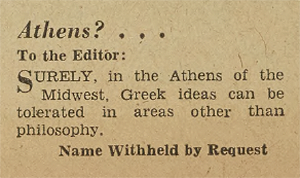
Ann Arbor’s nickname, “the Athens of the Midwest,” traces back to the 1850s, soon after the university set up shop there. The university shared its progressive reputation with the likes of U.C. Berkeley, Oberlin, Antioch, and Sarah Lawrence. With this abundance of liberalism and scholarship on hand, was there no one in this aspirational Athens to speak up for gay people?
Yes, finally. On January 13, Barton Meyers, a grad student, wrote a letter to the editor that cut through all of the crocodile tears that fellow students were shedding on behalf of those poor, sick homosexuals:
Although homosexual solicitation is defined by the laws of Michigan as a criminal offense, citizens of the “Athens of the West,” enlightened as they are in the ways of psychology, are quick to point out the pathology rather than the criminality involved in this behavior. They are sick people who must be hospitalized, not institutionalized.
How very easy these thoughts of Freud come to mind; how reassuring they are. At once, one is allowed to have compassion for the homosexual and have him removed. Perhaps the very tranquility induced by conceiving of the homosexual as sick should arouse one’s skepticism. Is it he who is sick, or is it the society which, not able to tolerate his deviation from its norms, chooses to arrest him?
Will his lack of procreation endanger the survival of the species? Hardly. Birth control is the problem. Is deviation from standards ipso facto pathological? Of course not. Deviation is merely a normative statement, not one pertaining to value judgements.
But can this particular deviation be indicted as pathological by psychoanalysis? Again, no. Normative statements can be made detailing wherein development resulting in homosexuality differs from that resulting in heterosexuality, but it should not pass value judgement in the phenomena which it studies. And is the homosexual dangerous to members of society? To say that attempts to form homosexual relationships are intrinsically wrong or dangerous as contrasted to attempts to form heterosexual relationships is to beg the question of whether or not the relationship itself is wrong or pathological.
Finally, were one to attempt a somewhat simplified definition of pathology such as prevalence of psychotherapy, it might possibly be true that homosexuals would appear to be sicker. But is this so startling in light of society’s scorn, repudiation and persecution of them? Treat any person harshly enough for an appreciable duration and the same effects will be witnessed. Perhaps it is indeed the society which, fearful of the disruption of its irrational standards and overly ready to mete out punishment, is the source of pathology.
Epilogue:
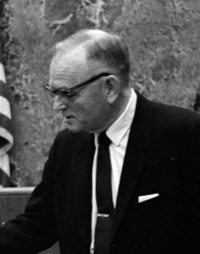
On March 12, attorneys for nine of the men asked for jury trials. Judge James R. Breakey, Jr., warned that if the defendants insisted on wasting his “valuable time” and the jury found them guilty, he would sentence them to six months in Southern Michigan Prison in Jackson, and add increased fines for good measure. But if the defendants changed their plea to guilty and “throw themselves on the mercy of the court,” he would only sentence them to thirty days in jail, and five years’ probation, and $375 in fines and court costs (about $3,200 today). One man committed suicide two days before he was due in court for sentencing.
For most of the students, the standard sentence was ten days in jail, five years’ probation, and $275 in fines and court costs (about $2,350 today). The university suspended them. They could re-register only after they sought private psychiatric care and were considered “good social risks.”
There was one tiny silver lining in all this: the press did not publish the names of those arrested. “What we are trying to do is fit these individuals back to society,” explained defense attorney Henry T. Conlin. “Publicizing their names will have the opposite effect — that of driving them out of society that much more.” Apparently the Ann Arbor News and the Michigan Daily agreed with that reasoning. The only name published was that of the man who committed suicide, and his name only appeared after his death.
Despite the suicide, the crackdown was considered a success. In May of 1950, Ann Arbor was selected as a pilot city for a four-day police school on sex crimes sponsored by the FBI. Police Chief Casper Enkemann said, “The course will include talks on the apprehension and detection of peeping toms, child molesters, obscene phone calls and letters, and homosexuality.” Another wave of arrests took place in 1962.
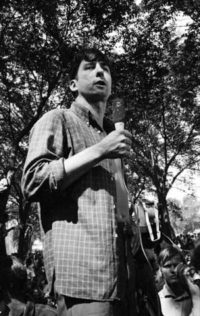 Michigan Daily staff writer Thomas Hayden was the very same Tom Hayden who co-founded the Students for a Democratic Society (SDS). In 1962, he drafted the Port Huron Statement, a foundational document of the emerging New Left, which called for a “radically new democratic political movement.” In 1968, he was one of the Chicago Seven arrested during protests outside the Democratic National Convention. Hayden and four others were convicted of crossing state lines to incite a riot, but the charges were reversed on appeal. He became a member of the California State Assembly in 1982. He joined the state Senate in 1992, where he remained until 2000. He died in 2016 at the age of 76.
Michigan Daily staff writer Thomas Hayden was the very same Tom Hayden who co-founded the Students for a Democratic Society (SDS). In 1962, he drafted the Port Huron Statement, a foundational document of the emerging New Left, which called for a “radically new democratic political movement.” In 1968, he was one of the Chicago Seven arrested during protests outside the Democratic National Convention. Hayden and four others were convicted of crossing state lines to incite a riot, but the charges were reversed on appeal. He became a member of the California State Assembly in 1982. He joined the state Senate in 1992, where he remained until 2000. He died in 2016 at the age of 76.
Hayden’s editorial today looks ill-informed, at best, or outright homophobic. But in 1960, it didn’t differ a whole lot from some of the articles appearing in ONE and the Mattachine Review, two of the three nationally-distributed gay and lesbian magazines at the time. Hal Call published Hayden’s full editorial in the Mattachine Review — complete with the “psychological problems of homosexuals” and the nods to attacking children and homosexual rings — because, as Call put it, Hayden “states the case as understandingly and as sensibly as possible.”
Which makes Meyers’s letter so incredibly ahead of its time. He managed to stake out a position that many gay rights activists themselves were unwilling to embrace. Frank Kameny encountered this resistance in 1965 when his resolution denouncing the homosexuality-as-sickness model provoked outrage from many fellow activists. They warned that challenging credentialed professionals was an absurd arrogance. We’re not experts, they said. Who are we to say we’re not sick? Kameny countered that, in fact, we are our own experts about everything concerning ourselves. The direct challenge to mental health professionals finally began in earnest in the closing years of the decade, and the American Psychiatric Association removed homosexuality from its official list of mental disorders in 1973.
Related:
![]() March 13, 1960: Michigan Man Commits Suicide Following Gross Indecency Conviction
March 13, 1960: Michigan Man Commits Suicide Following Gross Indecency Conviction
On the Timeline:
![]() December 22, 1959: Ann Arbor Police arrest 25 in “homosexual crackdown”
December 22, 1959: Ann Arbor Police arrest 25 in “homosexual crackdown”
Periscope:
 Headlines for December 22, 1959: A Western Summit of leaders from the U.S. Britain, France and West Germany concludes with a statement affirming Western resolve to protect West Berlin from the Soviets. President Eisenhower returns home from a twenty-day goodwill trip to eleven nations on three continents. U.S. agrees to close all four military bases in Morocco by the end of 1963. The Shah of Irans weds for the third time, seeking a wife who will give him a male heir. Pravda accuses former Soviet leaders of hiding or downplaying Stalins crimes. Connecticut Supreme Court unanimously upholds birth control ban.
Headlines for December 22, 1959: A Western Summit of leaders from the U.S. Britain, France and West Germany concludes with a statement affirming Western resolve to protect West Berlin from the Soviets. President Eisenhower returns home from a twenty-day goodwill trip to eleven nations on three continents. U.S. agrees to close all four military bases in Morocco by the end of 1963. The Shah of Irans weds for the third time, seeking a wife who will give him a male heir. Pravda accuses former Soviet leaders of hiding or downplaying Stalins crimes. Connecticut Supreme Court unanimously upholds birth control ban.
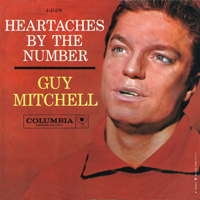 On the radio: “Heartaches By the Number” by Guy Mitchell, “Why” by Frankie Avalon, “El Paso” by Marty Robbins, “The Big Hurt” by Miss Toni Fisher, “Way Down Yonder in New Orleans” by Freddy Cannon, “It’s Time to Cry” by Paul Anka, “Mack the Knife” by Bobby Darin, “We Got Love” by Bobby Rydell, “Among My Souvenirs” by Connie Francis, “Hound Dog Man” by Fabian, “Little Drummer Boy” by the Harry Simeone Chorale.
On the radio: “Heartaches By the Number” by Guy Mitchell, “Why” by Frankie Avalon, “El Paso” by Marty Robbins, “The Big Hurt” by Miss Toni Fisher, “Way Down Yonder in New Orleans” by Freddy Cannon, “It’s Time to Cry” by Paul Anka, “Mack the Knife” by Bobby Darin, “We Got Love” by Bobby Rydell, “Among My Souvenirs” by Connie Francis, “Hound Dog Man” by Fabian, “Little Drummer Boy” by the Harry Simeone Chorale.
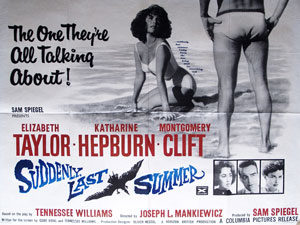
On television: Gunsmoke (CBS), Wagon Train (NBC), Have Gun, Will Travel (CBS), The Andy Griffith Show (CBS), The Real McCoys (ABC), Rawhide (CBS), Candid Camera (CBS), The Price is Right (NBC), The Untouchables (ABC), The Jack Benny Show (CBS), Bonanza (NBC), Dennis the Menace (CBS), The Danny Thomas Show (CBS) The Ed Sullivan Show (CBS), My Three Sons (ABC), Perry Mason (CBS) The Flintstones (ABC), 77 Sunset Strip (ABC).
New York Times best sellers: Fiction: Advise and Consent by Allen Drury (Pulitzer Prize winner), Hawaii by James Michener, The War Lover by John Hersey. Non-fiction: Act One: An Autobiography by Moss Hart, Folk Medicine: A Vermont Doctor’s Guide to Good Health by D.C. Jarvis, This Is My God by Herman Wouk.
Sources:
Note: In chronological order. All editions of Michigan Daily are available online here.
“25 seized at Michigan U. as Homosexuals.” Chicago Daily Tribune (Dec 23, 1959): part 2, page 9.
Thomas Hayden. “Nab 29: Authorities Apprehend Offenders.” Michigan Daily (January 5, 1960): 1.
Letter to the editor. Michigan Daily (January 7, 1960): 4.
Mrs. Rosalie Tucker, ’60. Letter to the editor. Michigan Daily (January 8, 1960): 4.
Thomas Hayden. Editorial: “Homosexual Crackdown of Dubious Value.” Michigan Daily (January 9, 1960): 4.
Barton Meyers. Letter to the editor: “Who Is Sick?…” Michigan Daily (January 13, 1960): 4.
Thomas Hayden. “Violators Defense Unknown.” Michigan Daily (February 13, 1960): 1, 2.
Hal Call. “Calling Shots.” Mattachine Review 6, no. 3 (March 1960): 18-19.
Andy Hawley. “Four given jail terms.” Michigan Daily (March 25, 1960): 1.
Peter Stuart. “‘U’ Suspends Four Students for Homosexual Activities.” Michigan Daily (May 10, 1960): 1.
Daniel Tsang. “Gay Ann Arbor Purges.” Midwestern Gay Academic Journal 1, no. 1 (April 1977): 13-19. Available online here.
![[Emphasis Mine]](http://jimburroway.com/wp-content/uploads/2018/02/Leyendecker.jpg)
